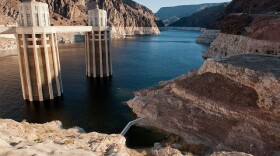Seven states that rely on a major river in the U.S. West are pushing for federal legislation to implement a plan to protect the water amid a prolonged drought, signaling they see the finish line in what has been years of negotiation.
The Colorado River serves 40 million people in Arizona, California, Colorado, Nevada, New Mexico, Utah and Wyoming. Representatives of those states are meeting Tuesday in Phoenix to sign a letter asking Congress to support their drought contingency plans.
Under the agreements, states voluntarily would give up water to keep Lake Mead on the Arizona-Nevada border and Lake Powell upstream on the Arizona-Utah border from crashing.
The push for federal legislation comes after the Colorado River Board of California voted Monday to move ahead without a water agency that has the largest entitlement to the river's water.
The Imperial Irrigation District was written out of California's plan when another powerful water agency, the Metropolitan Water District, pledged to contribute most of the state's voluntary water cuts.
Imperial had said it would not commit to the drought plan unless it secured $200 million in federal funding to help restore a massive, briny lake southeast of Los Angeles known as the Salton Sea.
"IID has one agenda, to be part of a DCP that treats the Salton Sea with the dignity and due consideration it deserves, not as its first casualty," Imperial board President Erik Ortega said.
The U.S. Bureau of Reclamation had given states until Tuesday to submit comments on what to do next after California and Arizona failed to meet federal deadlines to wrap up the drought plans.
That process likely will be stopped now that California is on board. Arizona says it doesn't expect its remaining work to delay implementation of the drought plan.
The states' plans are meant to supplement existing guidelines that dictate water deliveries to Arizona, Nevada and California. The Bureau of Reclamation previously predicted a more than 50 percent chance that Arizona and Nevada would not get their full allocations of water in 2020.
The latest study shows a shortage might be averted. But officials say one good year of snowpack won't reduce long-term risks on the river.







